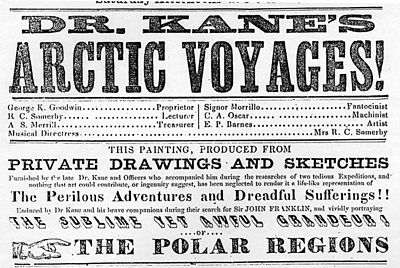Rufus C. Somerby
After this mechanical show completed its run, he oversaw its re-making into two smaller such theatres, one of which had its figures re-painted by a panorama broker in Providence, Rhode Island to present not "The Battle of Balaclava" in the Crimean War but the assault on Fort Sumter.
In any case, after the war he returned to the show trade, working with the well-known Boston actor and theatrical agent Edward P. Kendall as part of a variety troupe, established in 1867, which toured the country.
A highlight is his claim—undocumented, quite possibly spurious, but entertaining nevertheless—that while appearing with the show in Springfield, Illinois, he was involved in a dispute over a debt tied to one of the horses that drew his wagon, and sought out the law firm of "Lincoln and Herndon."
Not surprisingly, Abraham Lincoln was able to swiftly resolve the dispute, and Dr. Judd rewarded him with complimentary tickets to the panorama; "that evening he attended it, accompanied by one of his sons."
Dr. Judd's other reminiscences are of a similar sort, regaling his readers with tales of travel by wagon, steamship, packet boat, and train to every hinterland of the nation.
In the December, 1904 installment, "The Old Panorama," he recounts how he, (again, apparently speaking for or as Somerby), traveled to England to secure J.P. Thiodon's mechanical "Theatre of Arts" for a run at Barnum's American Museum.
The transformation was remarkably simple: "Our figures of Russian soldiers did not need much paint to turn them into Secessionists"; Lord Raglan was remade as Major Anderson, and a model of Fort Sumter was slipped over an extra patch of the Black Sea.
